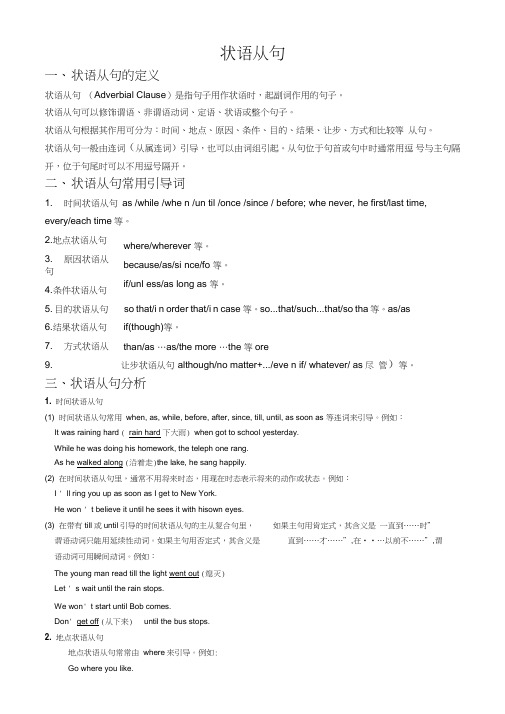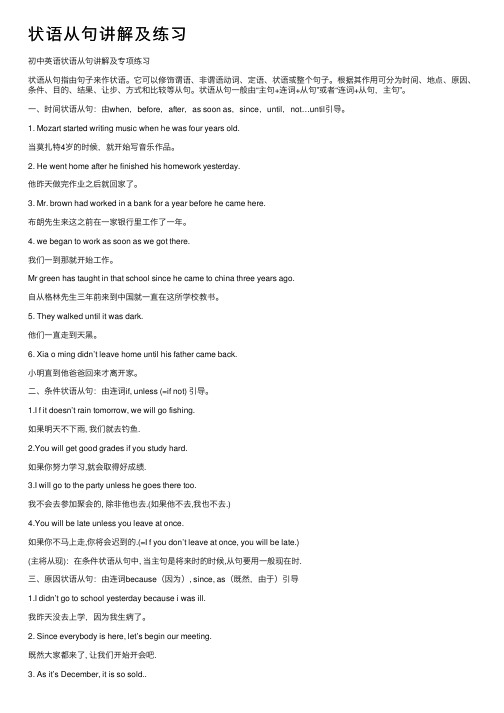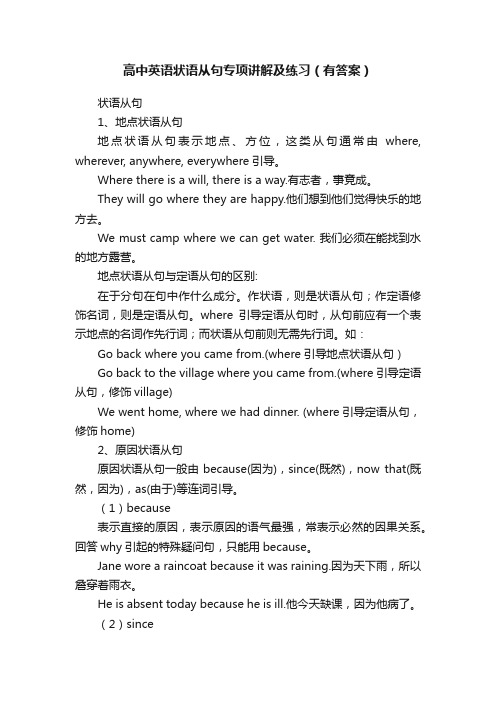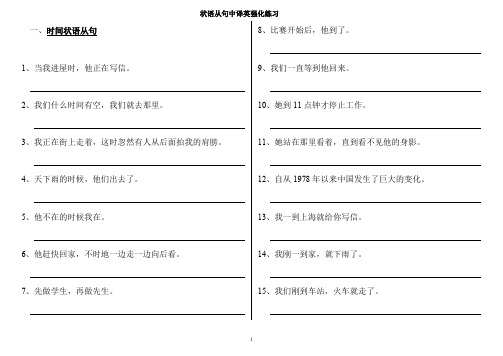英语语法专项:九种状语从句及练习
语法专题:状语从句(含练习和答案)

状语从句一、状语从句的定义状语从句(Adverbial Clause)是指句子用作状语时,起副词作用的句子。
状语从句可以修饰谓语、非谓语动词、定语、状语或整个句子。
状语从句根据其作用可分为:时间、地点、原因、条件、目的、结果、让步、方式和比较等从句。
状语从句一般由连词(从属连词)引导,也可以由词组引起。
从句位于句首或句中时通常用逗号与主句隔开,位于句尾时可以不用逗号隔开。
二、状语从句常用引导词1. 时间状语从句as /while /whe n /un til /once /since / before; whe never, he first/last time,every/each time等。
2. 地点状语从句3. 原因状语从句4. 条件状语从句5. 目的状语从句6. 结果状语从句7. 方式状语从句where/wherever 等。
because/as/si nce/fo 等。
if/unl ess/as long as 等。
so that/i n order that/i n case等。
so...that/such...that/so tha等。
as/as if(though)等。
than/as …as/the more …the 等ore9. 让步状语从句although/no matter+.../eve n if/ whatever/ as尽管)等。
三、状语从句分析1. 时间状语从句(1) 时间状语从句常用when, as, while, before, after, since, till, until, as soon as 等连词来引导。
例如:It was raining hard ( rain hard 下大雨) when got to school yesterday.While he was doing his homework, the teleph one rang.As he walked along (沿着走)the lake, he sang happily.(2) 在时间状语从句里,通常不用将来时态,用现在时态表示将来的动作或状态。
状语及状语从句(语法加练习完整讲解)

结果状语从句
The problem is so difficult that it will take us time to work it out. 这道题如此难以至于我们要用很多时间才能解决。
She is such a kind girl that everyone likes her. 她非常善良,以至于每个人都喜欢她。
not that...but that...(不是因为...而是因为)
条件状语从句
If you want to succeed, you'd better work hard. 如果你想成功,最好努力工作。 I'll come unless it rains. 除非下雨,否则我一定来。 You can borrow the book as long as you promise to keep i Ming studied so hard that he caught up with the others very quickly. 李明学习如此努力,结果很快赶上了其他人。
6.程度状语: I nearly forgot what he had promised. 我几乎忘记了他答应的事。
(2)如果动词前有一个或几个助动词,状语位于第一个 助动词之后。 He has already had his lunch.他已吃过午饭了。
(3)如果动词是be,状语就放在be动词之后。 He is always at home. 他总是在家。
3.状语位于句末,这是状语的通常位置。
We get up at six in the morning. 我们早晨六点起床。
三、状语的分类:
状语按用途可分为:地点、时间、原因、目的、 结果、条件、让步、程度、方式、伴随情况等几类。
状语从句知识点详解(初中英语专项复习)14

状语从句知识点详解(初中英语专项复习)状语从句的概念: 用一个句子作状语来修饰动词和形容词,以表明动作发生或状态存在的时间、地点、原因等,这个句子就叫做状语从句。
状语从句的分类:状语从句共分为九大类,包括:时间、地点、原因、条件、让步、目的、结果、方式、比较状语从句。
下面分别讲解:一、时间状语从句概念:用来表示时间的状语从句,由when, while, as, till, until,before, after, since等引导。
由于时间状语从句的引导词所表示的意思并非一致,不同引导词表达不同的时间,它们在句子中对应的时态、语态等也有所不同。
例如:when /while引导的时间状语从句when引导的从句的谓语动词通常是瞬间动词,也可以是延续性动词。
从句动作可与主语动作通常先后发生也可同时发生。
I was writing when my sister came back.( come是瞬间动词,只能用when引导,不能用while)He often wrote me when/while he studied in Shanghai International Studies University.( study 是延续性动词,while可代替when)While my mother was cooking , I was playing chess with dad. (cook是延续性的动词,cook和play同时发生)I like playing chess while my sister likes reading stories.我喜欢下棋,而我姐姐喜欢看小说。
(while表示对比)when和while的区别还有:while引导的时间状语从句多用于进行时态,而when引导的时间状语从句多用于一般时态。
While we were playing games, our headmaster called me .我们正在做游戏的时候,校长叫我了。
状语从句讲解及练习

状语从句讲解及练习初中英语状语从句讲解及专项练习状语从句指由句⼦来作状语。
它可以修饰谓语、⾮谓语动词、定语、状语或整个句⼦。
根据其作⽤可分为时间、地点、原因、条件、⽬的、结果、让步、⽅式和⽐较等从句。
状语从句⼀般由“主句+连词+从句”或者“连词+从句,主句”。
⼀、时间状语从句:由when,before,after,as soon as,since,until,not…until引导。
1. Mozart started writing music when he was four years old.当莫扎特4岁的时候,就开始写⾳乐作品。
2. He went home after he finished his homework yesterday.他昨天做完作业之后就回家了。
3. Mr. brown had worked in a bank for a year before he came here.布朗先⽣来这之前在⼀家银⾏⾥⼯作了⼀年。
4. we began to work as soon as we got there.我们⼀到那就开始⼯作。
Mr green has taught in that school since he came to china three years ago.⾃从格林先⽣三年前来到中国就⼀直在这所学校教书。
5. They walked until it was dark.他们⼀直⾛到天⿊。
6. Xia o ming didn’t leave home until his father came back.⼩明直到他爸爸回来才离开家。
⼆、条件状语从句:由连词if, unless (=if not) 引导。
1.I f it doesn’t rain tomorrow, we will go fishing.如果明天不下⾬, 我们就去钓鱼.2.You will get good grades if you study hard.如果你努⼒学习,就会取得好成绩.3.I will go to the party unless he goes there too.我不会去参加聚会的, 除⾮他也去.(如果他不去,我也不去.)4.You will be late unless you leave at once.如果你不马上⾛,你将会迟到的.(=I f you don’t leave at once, you will be late.)(主将从现):在条件状语从句中, 当主句是将来时的时候,从句要⽤⼀般现在时.三、原因状语从句:由连词because(因为), since, as(既然,由于)引导1.I didn’t go to school yesterday because i was ill.我昨天没去上学,因为我⽣病了。
高中英语状语从句专项讲解及练习(有答案)

高中英语状语从句专项讲解及练习(有答案)状语从句1、地点状语从句地点状语从句表示地点、方位,这类从句通常由where, wherever, anywhere, everywhere引导。
Where there is a will, there is a way.有志者,事竟成。
They will go where they are happy.他们想到他们觉得快乐的地方去。
We must camp where we can get water. 我们必须在能找到水的地方露营。
地点状语从句与定语从句的区别:在于分句在句中作什么成分。
作状语,则是状语从句;作定语修饰名词,则是定语从句。
where引导定语从句时,从句前应有一个表示地点的名词作先行词;而状语从句前则无需先行词。
如:Go back where you came from.(where引导地点状语从句)Go back to the village where you came from.(where引导定语从句,修饰village)We went home, where we had dinner. (where引导定语从句,修饰home)2、原因状语从句原因状语从句一般由because(因为),since(既然),now that(既然,因为),as(由于)等连词引导。
(1)because表示直接的原因,表示原因的语气最强,常表示必然的因果关系。
回答why引起的特殊疑问句,只能用because。
Jane wore a raincoat because it was raining.因为天下雨,所以詹穿着雨衣。
He is absent today because he is ill.他今天缺课,因为他病了。
(2)since表示对方已经知晓、无须加以说明的原因或事实,语气比because稍弱。
I'll do it for you since you are busy.既然你忙,我来替你做吧。
高中英语语法专项—— 状语从句(九大状语从句详讲+配套练习)

语法专项2——状语从句【状语从句综述】由从句担任的状语,在句子中可修饰谓语(或其它动词)、形容词、副词或是整个句子,它可以用来表示时间、地点、原因、目的、结果、条件、方式、比较、让步等。
一、时间状语从句1.表示时间的状语从句可由when, as, while, whenever, after, before, till (until), since, once, as soon as (或the moment ), by the time, no sooner … than, hardly (scarcely) … when, every time等引导。
例如:When I came into the office, the teachers were having a meeting.当我进入办公室时,老师们正在开会。
He started as soon as he received the news. 他已得到这个消息,就出发了。
Once you see him, you will never forget him.一旦你见了他,你就不会忘记他。
No sooner had I gone to bed than I went to sleep.我一上床就睡着了。
2.when, while, as的区别这三个词都可以用作连接词,表示时间关系,但有所区别。
(1)when表示时间关系时,意思常常是“当(在)……的时候”。
主句和从句中的动作或事情可以同时发生,也可以先后发生。
例如:When we were at school, we went to the library every day.我们在求学的时候,每天都到图书馆去。
(2)while 用作连接词表示时间关系时,意思也是“当(在)……的时候”,主句中的动作或事情在从句中的动作或事情的进展过程中发生。
它有时可与when通用,但它只能指一段时间(a period of time),而不能指一点时间的(a point of time)。
高中英语状语从句用法解析(含练习和答案)

高中英语状语从句用法解析英语语法状语从句类型综述状语从句主要用来修饰主句或主句的谓语。
一般可分为九大类,分别表示时间、地点、原因、目的、结果、条件、让步、比较和方式。
尽管种类较多,但由于状语从句与汉语结构和用法相似,所以理解和掌握它并不难。
状语从句的关键是要掌握引导不同状语从句的常用连接词和特殊的连接词即考点。
现分别列举如下:1.时间状语从句常用引导词:when, as, while, as soon as, while, before, after, since , till, until特殊引导词:the minute, the moment, the second, every time, the day,the instant, immediately , directly, no sooner … than, hardly …when, scarcely … whenI didn’t realize how special my mother was until I became an adult.While John was watching TV, his wife was cooking.The children ran away from the orchard(果园) the moment they saw the guard.No sooner had I arrived home than it began to rain.Every time I listen to your advice, I get into trouble.2.地点状语从句常用引导词:where特殊引导词:wherever, anywhere, everywhereGenerally, air will be heavily polluted where there are factories.Wherever you go, you should work hard.3.原因状语从句常用引导词:because, since, as, since特殊引导词:seeing that, now that, in that, considering that, given that, considering that, inasmuch as, insomuch asMy friends dislike me because I’m handsome and successful.Now that everybody has come, let’s begin our conference.The higher income tax is harmful in that it may discourage people from trying to earn more.Considering that he is no more than 12 years old, his height of 1.80 m is quite remarkable.4.目的状语从句常用引导词:so that, in order that特殊引导词:lest, in case, for fear that,in the hope that, for the purpose that, to the end thatThe boss asked the secretary to hurry up with the letters so that he could sign them.The teacher raised his voice on purpose that the students in the back could hear more clearly.5.结果状语从句常用引导词:so … that, so… that, such … that,特殊引导词:such that, to the degree that, to the extent that, to such a degree that,He got up so early that he caught the first bus.It’s such a good chance that we must not miss it.To such an degree was he excited that he couldn’t sleep last night.6.条件状语从句常用引导词:if, unless,特殊引导词:as/so long as, only if, providing/provided that, suppose that, in case that, on condition thatWe’ll start our project if the president agrees.You will certainly succeed so long as you keep on trying.Provided that there is no opposition, we shall hold the meeting here.7.让步状语从句常用引导词:though, although, even if, even though特殊引导词:as(用在让步状语从句中必须要倒装),while ( 一般用在句首),no matter …,in spite of the fact that, while, whatever, whoever, wherever, whenever, however, whicheverMu ch as I respect him, I can’t agree to his proposal.尽管我很尊敬他,我却不同意他的建议。
【语法专项训练】状语从句翻译专项练习及答案

一、时间状语从句1、当我进屋时,他正在写信。
2、我们什么时间有空,我们就去那里。
3、我正在街上走着,这时忽然有人从后面拍我的肩膀。
4、天下雨的时候,他们出去了。
5、他不在的时候我在。
6、他赶快回家,不时地一边走一边向后看。
7、先做学生,再做先生。
8、比赛开始后,他到了。
9、我们一直等到他回来。
10、她到11点钟才停止工作。
11、她站在那里看着,直到看不见他的身影。
12、自从1978年以来中国发生了巨大的变化。
13、我一到上海就给你写信。
14、我刚一到家,就下雨了。
15、我们刚到车站,火车就走了。
16、我们刚开始就被叫停。
17、我每次乘船都晕船。
18、我一听到这首歌,就感到很愉快。
19、下次你来的时候,就会见到他。
二、地点状语从句1、有志者,事竟成。
2、哪里有水,哪里就有生命。
3、你可以随意到你喜欢的任何地方去。
4、无论你去哪都要遵守法律。
三、原因状语从句1、昨天我回来晚了,因为我值班。
2、既然大家都到了,我们开始开会。
3、由于他英语懂得不多,他在字典中查阅这个单词。
4、鉴于天气已经晴朗,我们可以启程了。
5、鉴于他病情严重,我们派人去请医生去了。
四、目的状语从句1、我要把你的电话号码记下来,以免忘记。
2、我把真实情况告诉你,使你能自己作出判断。
3、他们比往常更加努力工作,为了能提前完成工作。
4、多穿点衣服,以免患感冒。
五、结果状语从句1、我们把收音机的音量放大,大家都听到了新闻。
2、他十分激动,以致一句话都说不出来。
3、他说出了这么重要的理由,得到大家的谅解。
4、这是一本十分有意思的书,大家都想看。
六、条件状语从句1、如果我们不怕困难,困难就算不了什么了。
2、除非下雨,我们明天就去那里。
3、只要你努力工作,你就一定能成功。
4、万一我忘了,请提醒我一下。
5、据我所知,那本书下月出版。
七、方式状语从句1、按照我教你的画一只猫。
2、按照人家告诉你做的去做。
3、看上去她好象是生病了。
4、他的行动就好象什么也没有发生。
- 1、下载文档前请自行甄别文档内容的完整性,平台不提供额外的编辑、内容补充、找答案等附加服务。
- 2、"仅部分预览"的文档,不可在线预览部分如存在完整性等问题,可反馈申请退款(可完整预览的文档不适用该条件!)。
- 3、如文档侵犯您的权益,请联系客服反馈,我们会尽快为您处理(人工客服工作时间:9:00-18:30)。
状语从句在复合句中作状语的从句叫状语从句。
状语从句有时间、地点、原因、目的、结果、条件、方式、比较、让步等种类。
一、时间状语从句引导时间状语从句的连接词有: when, as, while, after, before, since, ever since, as soon as, once, till, until, whenever, no sooner…than, hardly/scarcely...when, themoment/minute/instant/second, every time, each time, any time, the first time, next time, last time, all the time, by the time, directly, immediately, instantly等。
1.表示“一···就···”的句型1) as soon as/onceAs soon as he arrives, I'll call you.他一到,我就给你打电话。
(as soon as 侧重时间或动作先后衔接紧,而once侧重条件,表示“一旦...”)2) on doing sth/on one's + n.作时间状语On arriving at the station, the thief was arrested.一到达车站,这个小偷就被逮捕了。
On his arrival in Paris, he was recognized as a noble and thrown into prison. 他一到达巴黎,就被认出是一个贵族,并被投入监狱。
3) no sooner ...than , hardly/scarcely...when它们表“一…就”。
结构中的否定词放在句首时,主句要倒装。
(主句都用过去完成时,从句用一般过去时。
)No sooner had he reached home than it began to rain.他刚到家,天就开始下雨了。
Hardly/Scarcely had I entered the room when the phone rang.我一进屋,电话就响了。
当no sooner, hardly, scarcely不放在句首时,主句不倒装,如:I had no sooner reached the bus stop than the bus started.我刚到车站,车就开走了。
I had scarcely(hardly)entered the room when the phone rang.4)the moment, the instant, the minute, the secondThe moment I saw him, I recognized him.我一看见他,就认出了他。
We'll leave the minute you are ready.你一准备好,我们就出发。
5)有些副词如:instantly, immediately, directly可用作连词,后接从句。
I left immediately the clock struck 5.我刚走,钟就敲了五点。
2. when, while, as引导时间状语从句1) when的用法①when既可指时间点,也可指时间段(即:从句动词可以是短暂的也可是延续的);主从句动作可同时也可先后发生。
I was thin when I was a child.当我是个孩子的时候,我很瘦。
It was raining when I arrived.我到达时,天正在下雨。
①在when引导时间状语从句时,如果从句主语与主句主语相同或为it,且从句有be动词,则从句可省主语和be动词,如:When (you are) in trouble, you can visit this man.当你有麻烦时,可以找这个人。
She is always listening to music when(she is) doing her homework. 当她做作业时,总是听音乐。
①when在下列结构中, 译成“这时”,它引导的是并列句be about to do ... when, be doing ... when, had done ···when,be on one's way ... when, be on the point of doing ... when(参见“连词”部分when的用法)2)while用法while只能指一段时间,从句中的动词必须是延续性动词。
强调某一段时间内发生主句动作,相当于during the time that....My mother was cooking while I was doing my homework.当我在做作业时,妈妈在做饭。
I am safe while I am here.我在这儿的时候,我很安全。
while除引导时间状语从句外,还引导对比句,作“然而”讲;并可在句首引出让步状语从句作“虽然···但”讲。
I like watching TV, while he likes reading.我喜欢看电视,而他喜欢读书。
While he has his own car, he often uses mine.尽管他自己有车,他却常用我的。
3) as的用法① as引导时间状语从句时常可和when换用,但较强调同时发生,多指短暂动作。
As I left the house, I forgot the key.我离家时,忘了带钥匙。
① as还可说明两种正在发展或变化的情况,“随着...”的意思,表时间的推移。
如:As I get older, I get more optimistic.随着年龄的增长,我变得更加乐观。
①as表“一边…一边…”,引出伴随动作。
He hurried home, looking behind as he went.他匆忙地回家,边走边往后看。
①用以强调两个动作紧接着发生。
As he was going out, it began to rain.当他出去的时候,天开始下雨了。
①as有时引出一个名词,相当于一个时间状语从句。
As a boy (when he was a boy), he was hopeless at maths.当他是孩子时,他对数学失去希望。
3. before引导的时间状语从句①before引导的时间状语从句不用否定式谓语。
Before they got to the bus stop, the bus had gone.在他们到达公共汽车站之前,公共汽车已经走了。
①在“It be + 时间段+ before从句”句型中,肯定句译成“…(之后)才”,否定句译成“…就”。
该句型有一般过去时、过去将来时、一般将来时三个时态,且有否定句。
It will be some time before... do...It was some time before...did...It would be some time before...did...It was long before...did...“很久才···”It wasn't long before...did...“不久就...”It will be many years before the chemicals start to escape fromthe containers. 多年以后化学物质才开始从容器中逃逸。
It was not long before he came back.不久他就回来了。
It was a long time before he got to sleep again.很久他才再次入睡。
It was a week before he could tell his story.一个星期后他才能讲述他的经历。
It wasn't long before he told us about himself.不久他就给我们讲述了他自己的故事。
▲before可译成“未来得及”He had measured me before I could get a word.我还未来得及插话,他就量好了尺寸。
▲before可译成“趁着还没”I'll write it down before I forget.趁着还没忘我要把它写下来。
4. until和till1)“延续性动词肯定式+until”表示“动作延续到…为止,”译为“直到…为止”,如:I waited for him until he came back. 我一直等到他回来。
2)“终止性动词的否定式+ until”表示“直到···才”。
He didn't go to bed until he had finished his work. 直到完成工作他才睡觉。
3)用于强调句式“It is not until ...that ...”It was not until the professor came that we began the experiment.在教授到来之后,我们才开始实验。
4) not until放在句首时,主句倒装。
Not until he graduated did he succeed in obtaining this compound. 直到他毕业他才成功获得这种化合物。
句首和强调句中要用until,而不用till;not...until...句型中不用till。
5. since引导时间状语从句,意为“自从…时起”,主句要用完成时。
Mr. Li has been here since he came back.自从李先生回来以后,他一直在这儿。
I haven't heard from him since he lived here.自从他住在这儿以来,我就没有收到过他的来信。
I've known Mr. Smith since I was a boy.我小的时候就认识史密斯先生了。
6.时间状语从句的省略式当时间状语从句的主语和主句主语相同或为it,从句又含be动词时,从句可省略主语和be动词。
在不产生歧义时,连词也可省去。
